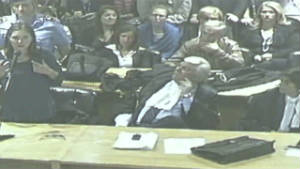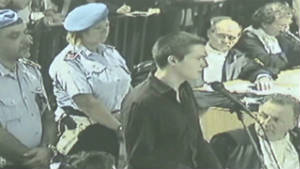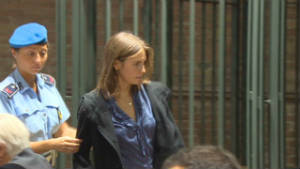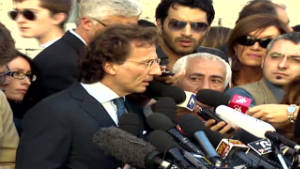Our formula for a reliable denial is 3 fold. These three elements should be present, but without anything added:
1. First Person Singular
2. Past Tense
3. Event specific
Any addition to these three, including qualifiers, should be deemed as unreliable.
Statement Analysis of Amanda Knox has shown participation (presence) in a sexual homicide. Her words specifically are associated with sexual crime; and when she lied when questioned, she had a reason to lie. She now speaks to an Italian court seeking release under intense media pressure. In spite of botched investigation, inappropriateness, and possible tainted evidence, Amanda Knox' own words have placed her at the scene of the murder as her lies were uncovered. By her own words we know that she was a part of a sexual homicide, was at the crime scene, and participated in the clean up. Afterwards, she lied and sought to implicate her former boss, showing a need to lie.
Even coerced confessions show, via statement analysis, that they do not come from the subject's experiential memory and will show to be deceptive.
American justice, in the eyes of Europe, is often associated with OJ Simpson and the Impeachment of President Clinton (perhaps now Casey Anthony) and very expensive campaigns have been run by Amanda Knox' family in the court of public opinion.
In spite of all arguments, for and against Knox, we have her own words, including her letter, in which Statement Analysis gets to the truth.
Long forgotten is the victim.
Below analysis continues in bold type.
Even coerced confessions show, via statement analysis, that they do not come from the subject's experiential memory and will show to be deceptive.
American justice, in the eyes of Europe, is often associated with OJ Simpson and the Impeachment of President Clinton (perhaps now Casey Anthony) and very expensive campaigns have been run by Amanda Knox' family in the court of public opinion.
In spite of all arguments, for and against Knox, we have her own words, including her letter, in which Statement Analysis gets to the truth.
Long forgotten is the victim.
Below analysis continues in bold type.
Perugia, Italy (CNN) -- Nearly four years after she was arrested on suspicion of having killed her roommate in this picturesque Italian university town, Amanda Knox got one last chance Monday to persuade a jury she didn't do it.
"People always ask who is Amanda Knox? I am the same person I was four years ago. But I have lost a friend. I have lost my faith in Italian police. I am paying with my life for something I have not done. Four years ago I didn't know what suffering was," Knox said, delivering her statement in Italian.
Note that she speaks in the 3rd person. Note that she is a "person" not a "woman" of four years ago in what was a sexual homicide. Note that what she has not done is "something".
"I did not kill. I did not rape. I did not steal," she added. "I was not there."
Note that we deal with the unexpected. We expect an innocent person to say "I did not kill Meredith" but she drops the object of "kill" and adds "rape" and "steal" and "I was not there" as reference to location is obvious, but not stated. Prior analysis suggests that Amanda Knox did not deliver the fatal wound to Meredith though she was involved in the clean up afterwards, by her own words. She may have received a lesser sentence had she told the truth from the beginning.
Knox and co-defendant Raffaele Sollecito are fighting to be acquitted of the murder of Meredith Kercher. Prosecutors have called for the pair's sentences -- of 26 and 25 years, respectively -- to be increased to life.




The case is now in the hands of two judges and six jurors, who retired together within minutes of Knox's statement to consider their ruling.
Knox and Sollecito were convicted of the killing and related crimes in December 2009. Their appeal has focused largely on DNA evidence found on a knife and on a bra clasp belonging to the victim.
Knox's words capped a dramatic week of closing arguments by the host of lawyers battling over the outcome, from the lawyer for a man falsely accused of the crime, who called Knox "Lucifer-like, demonic, Satanic," to the Sollecito defense counsel Giulia Bongiorno, who insisted that like the buxom cartoon temptress Jessica Rabbit in the movie "Who Framed Roger Rabbit?" Knox is not bad, just "drawn that way."
Knox told the court she always wanted justice for Kercher, her roommate at the university.
"I am innocent. Raffaele is innocent," she said.
At the conclusion of her statement, Knox put her hands on her face and wept.
Before Knox addressed the court, Sollecito asked the court to set Amanda and him free.
Sollecito described the original investigation, the trial and the jailing as "living in a nightmare."
"Amanda and I have spent 1,400 days in prison, more than 20 hours a day in a very small space," he told the court.
Knox was 20 and Kercher was 21 years old, studying at Perugia's university for foreign students, when Kercher's semi-naked body was found in the house they shared.
Sollecito, 23 at the time, was Knox's boyfriend, studying computer science at another university in Perugia.
Knox did not look at Sollecito as he addressed the court, though he detailed for the judges and jurors the night of Kercher's murder. The couple have maintained they were together at Sollecito's residence the night Kercher was killed.
He described the night as a happy, almost idyllic one for him: "I was about to hand in my thesis. I had just met Amanda, a beautiful, sunny girl." He said Knox's employer had given her time off so they could go away together for the weekend.
Throughout the ordeal, Sollecito told the court he wore a bracelet that said "Free Amanda and Raffaele."
"I have never taken it off. I think the time has come to take it off," he said, fingering it nervously.
"I hope this is a part of history, and that Amanda and I have a future."
His comments followed closing arguments by his and Knox's defense attorney, Luciano Ghirga, who railed against the murder investigation. Ghirga said his clients' convictions must be overturned because the case is based on "erroneous" evidence.
Prosecutors and police say Kercher's genetic material was on the blade and Knox's was on the handle, and that a Kercher bra clasp found at the crime scene had Sollecito's DNA.
Defense lawyers and independent experts argued strenuously during the appeal that the DNA testing process was badly flawed and the results should be inadmissible.
As Ghirga made his final statements to the court, he reminded the jury that the standard is "beyond a reasonable doubt."
"We ask you to give complete freedom to Amanda Knox," he said.
Knox has addressed this jury at least once before, telling them in June she was "shocked" at the testimony of the third person convicted of the crime, Rudy Guede, a drifter originally from the Ivory Coast.
Guede admitted having sexual relations with Kercher but denied killing her.
Guede was sentenced separately to 30 years behind bars for the murder, a sentence that was reduced to 16 on appeal.
In June, he refused to tell the court hearing Knox and Sollecito's appeal that they had not been involved.
A prosecutor then read a letter Guede had written to a newspaper from prison, saying he thought they had killed Kercher.
"The only time Rudy Guede, Raffaele Sollecito and I were in one room together was in a courtroom," Knox told the court in June.
Her defense dismissed Guede's letter as based on "a feeling," not facts or events he witnessed.
Before the hearing began Monday, Knox's stepfather told CNN he was optimistic about the outcome of the appeal. He made his way into the court through a throng of reporters, ignoring shouted questions from journalists.
Either side can appeal this court's ruling to Italy's High Court, but such an appeal will be on narrow technical grounds only.
No comments:
Post a Comment